#Can I Eat Raw Asparagus During Pregnancy?
Text
Is It Safe To Eat Asparagus During Pregnancy?
Is It Safe To Eat Asparagus During Pregnancy?
#Is #It #Safe #To #Eat #Asparagus #During #Pregnancy
#nutrition,asparagus #health #benefits,benefits #of #asparagus,health
Asparagus during Pregnancy can be a delightful addition to your diet. This versatile vegetable provides a burst of flavor and offers numerous health benefits. Asparagus supports the healthy development of your baby. Folate is essential during Pregnancy as it aids in forming your baby’s neural tube and helps prevent certain birth defects. So, enjoy this vibrant green veggie as part of your…
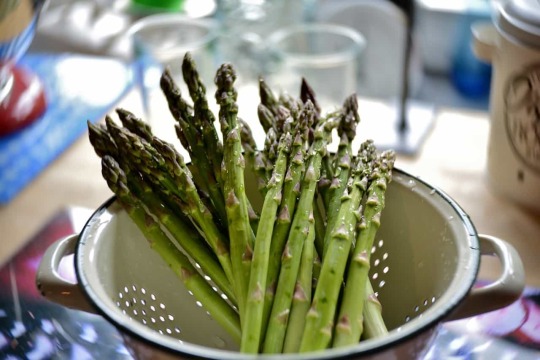
View On WordPress
#asparagus#asparagus benefits#asparagus benefits for men#asparagus during pregnancy#Asparagus during Pregnancy First#asparagus health benefits#asparagus nutrition#asparagus nutrition data#asparagus recipe#Asparagus Recipes#asparagus uses#asparagus uses and benefits#baked asparagus#benefits of asparagus#Benefits of Asparagus During Pregnancy#benefits of asparagus juice#benefits of eating asparagus#Can I Eat Raw Asparagus During Pregnancy?#diet during pregnancy#dog eat asparagus#eating asparagus#eating fish during pregnancy#eggs during pregnancy#fish during pregnancy#foods to avoid during pregnancy#foods to eat during pregnancy#gas during pregnancy#grilled asparagus#health benefits of asparagus#health benefits of asparagus during pregnancy
0 notes
Text
My favorite green salad: A simple TCM salad recipe for spring
I never liked to eat salad, but there is a salad that I always liked to eat: bird salad (lamb's lettuce) with potatoes and pumpkin seed oil!
And this was exactly the most popular recipe in my "Eat more green" challenge in April 2016 on Facebook, with more than 100 likes.
The challenge was to eat green foods every day to strengthen the liver and optimally support the body, especially in spring.
The color green belongs to spring according to the 5-element teaching! Actually chicken mei fun , if you look outside. :)
Salads from raw food are according to TCM
strongly cooling
difficult to digest
That is why the TCM recommends always adding cooked ingredients to the raw ones. This way you can enjoy your salad without stressing your digestion. (Especially recommended if you have a tendency to mushy stools and diarrhea as well as cold feet.)
Recipe Vogerl potato salad with mushrooms and asparagus
Cook the potatoes until firm, peel and slice them
Clean / wash some mushrooms (I like to use cream mushrooms) and cut them into quarters or halves
Wash green asparagus and cut into pieces approx. 3 cm long (peel the ends or throw them away)
Fry the asparagus and mushrooms with olive oil and herbs from Provence for about 10 minutes, salt
Wash the bird salad well and arrange with the remaining ingredients
season with pumpkin seed oil and a little lemon
Effect according to TCM
Vogerlsalat (lamb's lettuce) is slightly cooling to neutral. Of all green salads, it is the least cooling.
It especially strengthens the liver and heart blood.
Favorable for the following symptoms:
anemia
blurred vision and night blindness
Palpitations
Trouble falling asleep
inner unrest
Vogerlsalat also has a laxative effect, so it is good for those who tend to become constipated.
White asparagus especially strengthens the lung yin, which e.g. for dry cough, hoarseness and dry skin is beneficial.
Green asparagus supports the liver (especially the liver blood) and is less cooling than white asparagus (thermal effect: neutral).
Asparagus generally wicks away moisture (good for edema, cystitis, hypertension), helps with constipation and also has a detoxifying effect.
Caution: Asparagus is not recommended for gout and kidney stones. Also, you shouldn't eat too much of it during pregnancy because of its draining effects. (Source: Praxisbuch Lebensmittel und Chinesische Medizin, Bacopa-Verlag)

Potatoes strengthen the stomach and help with acidification. (Potatoes and their effects according to TCM)
Mushrooms remove moisture and have a detoxifying effect. They cool the stomach and lungs and strengthen the yin (e.g. with a dry cough).
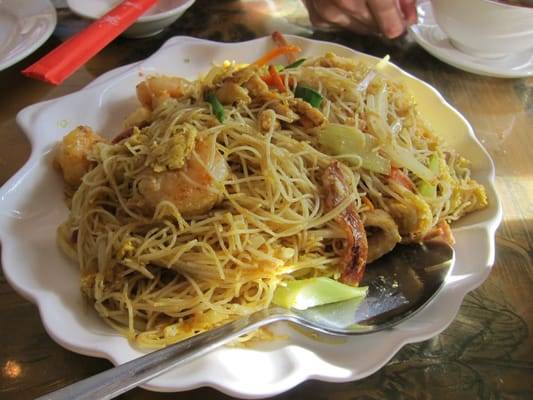
Mushrooms are particularly recommended for those who are overweight.
Pumpkin seed oil especially supports the bladder, kidneys and prostate.

It helps drain moisture, such as painful urination and irritable bladder. You can increase the effect by adding pumpkin seeds over the salad.
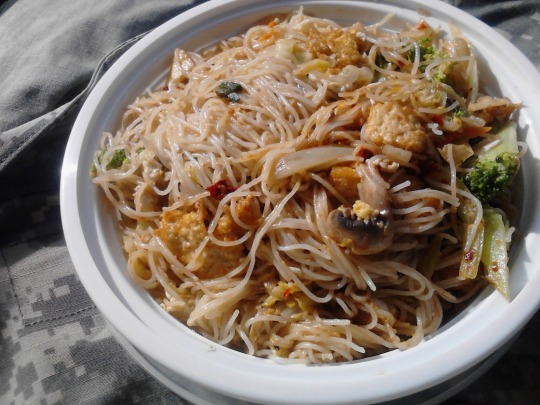
#mei fun#chow mei fun#what is mei fun#what is chow mei fun#singapore mei fun#mei fun noodles#singapore chow mei fun#mei fun noodle#beef mei fun#chicken mei fun#mei fun recipe
1 note
·
View note
Text
10 Foods That Will Help You Add Weight
Savor this meal by pairing it with one of my savory, finger-licking Nigerian soups. All of these factors combine to create a fascinating and diverse cuisine, that offers a range of tastes and colors for many different palettes. Nigerian food is an African cuisine not to be missed.
African Inspired Design Salad Servers
Yoghurt is another great healthy dairy product for pregnant women, especially Greek yoghurt. Yoghurts are highly rich in calcium and some yoghurts contain probiotic bacteria which improves digestive health. Now, we’ll look at some common Nigerian foods that should be consumed during pregnancy.
It can be presented with pastas or soups and paired with selected condiments on offer. It is famously known as rabbit and can be found in the Indian cafés around the major urban centers. For the most part considered as a non-veggie lover dish yet in some cases the curry is made with vegetables and is called as beans rabbit.
Pulse briefly at low speed to remove any lumps but do not puree.
500 Fifth St., NW | Washington, DC © 2022 National Academy of Sciences.
The choice of foods on your food timetable must be within your food budget.
Honestly, I think the attention is well-deserved. I know a tad dramatic but after many years of cooking for a family I’m rather burnt out. But I love eating and exploring the foods of other cultures.
Fresh Produce & Halal Meat
The British were the next to influence eating and drinking habits, importing new breeds of sheep, goats and cattle, together with strawberries and asparagus. This tantalizing beef stew has evolved into an everyday meal, cooked with different cuts of meat and seafood and always present on restaurant menus. But to most people Christmas would never be complete without stew. Producing handmade spicy condiments and chilli sauces in small batches, which are versatile, easy to use and compliment a variety of meals.

What Do Africans Eat?
Common grains such as wheat and corn are comparatively rich in amino acids that amaranth lacks; thus, amaranth and grains can complement each other. Known by various names in Africa – mchicha in Swahili, terere among the Gikuyu, Meru and Embu of Kenya, doodo in Uganda and shoko in Yoruba, both the leaves and grain of amaranth are used as food. Here is the best African food that you need to try.
In our wide selection, you will find more than just African food, since we also sell Caribbean and Asian products at wholesale level. Our headquarters are located in Antwerp, Belgium. Continue reading to find out more about our specific products. Many families personalize their desserts providing slight variations for this dessert all over the country. During your time in South Africa, be sure to try several different kinds of melkterts as quality melkterts in South African style are hard to come by anywhere else in the world. Another sweet delicacy which has a Dutch root, this sweet elastic apricot pudding joy is generally made by Cape Malay individuals as well.
South Africa’s streets, shores and vineyards are lined with so many incredible restaurants, it’s a hard task narrowing them down into a short bucket list. In 2016 she obtained a diploma in culinary arts from The Culinary Training and Innovation Academy in Centurion and completed her training under Chef Werner at the Saxon Hotel in Johannesburg. In the same year, she took part in The Mandela Washington Fellowship at the University of Wisconsin Stout in the US.
Those swollen root tissues amount to 10 to 20 percent raw protein, which is of high nutritional quality. For children, especially, yambean may be valuable. Nibbling on the tasty raw tubers will provide a quality protein of a kind they cannot easily get elsewhere. With a crude-protein content of percent, lablab seeds are worth considering in malnutrition prevention programs. In addition, the amino acids are moderately well balanced, with an especially high lysine content, which means that they help balance out diets that are over-heavy on the staples.
The couple decided to enter the frozen food industry because they wanted their young daughters to see their culture reflected at the grocery store. CHICAGO -- A South Side couple is diversifying the frozen food aisle at grocery stores with West African cuisine. Together owner Greg Gatlin and Chef Michelle Wallace of Gatlin’s BBQ are serving up the exceptional deep South barbecue classics that are living up to Texas’ reputation. Their newest breakfast menu has everything from belly stuffing chicken biscuits and BBQ breakfast sandwiches, to BBQ and Tex-Mex fusion offerings. An all-morning breakfast joint with a line around the block, The Breakfast Klub, known for their chicken and waffles, is a community staple to the Midtown neighborhood. On any given day, you’re likely to see the owner, Marcus Davis, of this 20-year-old restaurant, laughing with customers and talking politics.
1 note
·
View note
Text
Nutrition Program During Pregnancy: What should pregnant women eat?


Nutrition Program During Pregnancy: What should pregnant women eat?
When you find out that you are pregnant, one of the questions in your mind is what should be eaten during pregnancy .
Perhaps you will have to put aside old eating habits and start eating healthy, or maybe you are feeding exactly what it should be.
This article will satisfy all your curiosity. Don't forget to watch the videos. Here's what to eat during pregnancy!
The list of things to eat while pregnant in 4 steps
We will make the job easier by collecting the list of things to be eaten while pregnant in 4 main groups. Because these 4 food groups are at the heart of a healthy diet.
The goal of feeding during pregnancy should be to consume all the nutrients that will support the development of your baby in a balanced way.
For this, you should choose what you eat not from empty calorie sources, but from nutritious groups. Here are the foods to be eaten during pregnancy in 4 steps !
1- Foods Containing Protein: Meat, Eggs and Legume Group / 3-4 Servings Per Day
The need for protein increases during pregnancy. The most important food source for the development of the baby is proteins. For this , if you are wondering what I should eat while pregnant , you can start from protein sources.
You can eat about 100-120 grams of red meat, chicken, turkey or fish a day. Eating meat during pregnancy is very important as it will meet the need for animal protein. Because animal proteins provide you with all the amino acids you need. These are called whole proteins.
The most important thing to consider when consuming animal protein is that the meat products are well cooked. Because during pregnancy, you should avoid foods such as raw or undercooked meat, chicken, fish and eggs.
You should also consume vegetable proteins to increase nutrients. On days when you do not consume animal protein, you can meet your protein needs by eating 1 plate of legumes and eggs.
2- Foods Containing Calcium: Milk and Dairy Products Group / 3-4 Portions Per Day
Milk and dairy products are very good sources of calcium and protein. Therefore, milk consumption during pregnancy is extremely critical. Since they are rich in both calcium and protein, you can hit 2 birds with 1 stone in this group during pregnancy.
You should know these to learn about other vitamins and minerals that should be taken during pregnancy besides protein and calcium: what are the vitamins and minerals that should be taken during pregnancy You should definitely take a look at our article.
Since calcium is the most important mineral for bone and tooth development, the milk group is among the foods that pregnant women should eat .
By consuming two slices of cheese, 2 cups of milk or yogurt, you should add an average of 3 to 4 servings of milk to your daily diet.
Consuming excess salt and taking caffeine reduces the absorption of calcium. Don't forget that.
3- Fruits and Vegetables: All Colors of the Rainbow
Remember, all fruits and vegetables are worthy to be eaten during pregnancy. That's why you should keep as much variety in vegetable and fruit consumption as possible.
Always remember that when shopping for vegetables and fruits, you should have all the colors of the rainbow in my basket: orange, green, red, yellow!
Foods Rich in Vitamin C: 2 servings a day
As you can imagine, especially the source of vitamin C is fresh vegetables and fruits. So eating fruit during pregnancy should be a ritual that should not be missed. You should definitely consume fruits or vegetables rich in vitamin C every day. Orange, tangerine, grapefruit, strawberry, apple, watermelon, pineapple, green pepper, broccoli, tomato, melon are among the fruits and vegetables to be eaten during pregnancy .
Green Leafy Vegetables: 1-2 Portions a Day
Dark green leafy vegetables are rich in folic acid and B6. It also protects against constipation because they contain pulp. You have to make sure that you consume rocket, cress, purslane, chard, spinach, leek, dill, parsley, celery leaves and green leafy vegetables during the day.
Yellow, Orange, Red and Purple Vegetables and Fruits: 1 Servings a Day
Dark yellow, orange and red fruits and vegetables contain beta-carotene, a vitamin precursor, and are very powerful antioxidants. Vitamin A is essential for healthy cell development.
Try to consume rich foods on a color scale such as carrots, sweet potatoes, apricots, zucchini, persimmon, beets, purple cabbage, red forest fruits, provided that it is in season.
4- Whole Grain Foods and Bread Group
The bread and cereal group constitutes the energy leg of the daily diet list during pregnancy . It also forms the basis of nutrition.
Cereals are rich in B group vitamins. It also contains important minerals such as selenium, zinc, chromium, magnesium.
For a healthy diet, you should prefer foods made from whole grains instead of refined grains. Accordingly, you should also turn to bread made from whole wheat flour in consumption of bread during pregnancy .
You should consume bread, pasta, bulgur, legumes made from whole wheat flour.
White rice, bread made from white flour, pasta, cakes made with white flour, cookies are among the carbohydrates you should avoid.Nutrition During Pregnancy: What should pregnant women eat?
Nutrition Table During Pregnancy
Food ItemFood SourceDaily ServingsFoods Containing ProteinRed meat, chicken, turkey, fish, eggs or legumes3- 4 (100-120 grams)Foods Containing CalciumMilk, cheese, yogurt3 - 4Foods Containing IronEgg and red meat2ndWhole Grains and Bread (Zinc, Magnesium and Rich in Vitamin B)Bulgur, bread from whole wheat flour, pasta, dried legumes8 (1 serving = 1 thin slice of brown bread = 1 cup of soup = 3 tablespoons of bulgur pilaf)Foods Containing Vitamin CVegetables and fruits: Orange, tangerine, green pepper, strawberry, apple2ndGreen Leafy Vegetables (Rich in folic acid and B6)Spinach, rocket, cress, purslane, chard, kale1 - 2 (1 serving = 1 bowl of salad = 6 tablespoons of vegetable dish)Yellow and Orange Vegetables and Fruits (rich in vitamin A and beta carotene, antioxidants)Carrot, pumpkin, persimmon, sweet potatooneFatty FoodsWalnuts, almonds, hazelnuts2 - 3 (2 walnuts or 6-8 almonds or hazelnuts = 1 teaspoon of oil)
How To Be A Nutrition List During Pregnancy?
The Most Useful Foods in Pregnancy: What to Eat for the Development of the Baby During Pregnancy?
Before you were born, you started to think about how to gain weight to your baby and how to support its development. That's why the same question is always on his mind: What should he eat in order for the baby to gain weight during pregnancy?
Omega-3
It is said that women who consume fish regularly while pregnant have a healthier pregnancy and bring more obese babies to the world. That's why you should consume fish at least once a week. If you cannot eat fish, you can eat nuts with peanuts, nuts, nuts and omega 3 as a snack. These foods are also very useful for the intelligence development of the baby during pregnancy.
Do not forget that you need to consume vitamins and minerals such as iron, folic acid, iodine, zinc, vitamin B, omega 3 and 6 fatty acids during the pregnancy for the development of your baby's body and intelligence! The most important time to get enough of those wonderful oils called omega-3 is the 3rd trimester, when the brain development of your baby is accelerated.
Folic acid
Folic acid, also called folate, folasin or vitamin B9, has a special place in pregnancy. Research shows that taking folic acid during pregnancy helps prevent or reduce neural tube defects that may occur in the baby.
Researchers believe that spina bifidan will be largely inhibited if expectant mothers take 0.4 mg folic acid daily before and during the first 13 weeks of pregnancy. Of course, the person who will make the best decision will be the doctor who will follow you from the beginning to the end of your pregnancy.
Although the doctor will supplement the drug for folic acid, it's okay to recognize foods containing folic acid. Asparagus, avocado, banana, black beans, broccoli, egg yolk, citrus fruits, green leafy vegetables, green beans, strawberries, lentils, peas, liver, yogurt are foods rich in folic acid.
Eating right during pregnancy is the first and best gift you can give to your baby. For this, you should definitely take a look at our Everything You Need to Know About Nutrition During Pregnancy .What to Eat for Weight Loss and Development of the Baby During Pregnancy?
How Should Water Consumption Be During Pregnancy?
You should definitely include at least 8 large glasses of water (8 x 250 cc) per day in your daily nutrition program during pregnancy .
Your baby's body is made up largely of fluid, like yours. Your body also needs more water than usual during pregnancy. So what are the benefits of drinking water?
It keeps your skin soft.It reduces constipation.It purifies you and your baby's body from toxins and waste materials.It reduces excessive swelling and edema.It prevents urinary tract infections.It reduces the risk of preterm birth.
In short, take care to drink at least 8 large glasses, at least 2 liters of water every day. The easiest way to do this is to keep the water close enough for you to see and reach instantly. If you forget to drink glasses, you can measure yourself with a glass bottle.
If your body is holding too much fluid, if you exercise a lot and the weather is very hot, try to drink more. But try not to make drinking water just before eating. Otherwise, you may be too clogged to eat.
Finally, do not forget that the teas, juices and other liquids you drink never replace water.
How should salt consumption be during pregnancy?
As you know, salt used to be completely restricted during pregnancy because it triggered edema, water retention and swelling in the body.
It is now considered normal and necessary to increase the body fluids to a certain extent while pregnant. Therefore, a moderate intake of sodium is recommended to keep the amount of fluid in the body at the proper level. Because sodium deprivation can be harmful to the development of the fetus.
Nevertheless, too much salt and too salty foods are harmful to everyone, especially if you are pregnant or have become a habit.
Moreover, you should know that there is a tight connection between high salt intake and high blood pressure after pregnancy and childbirth. So you should avoid foods with high salt content such as soy sauce, ready pickles, chips.
As a general principle, you can try not to add salt when cooking dishes. Already, the sodium content of nutrients meets what our body needs.
Instead of ready-made pickles, if you are very troubled, you can take home-made pickles that are made with little salt. But that doesn't mean you can sit and eat a jar of pickles.
As always, you can take your doctor's opinion about salt use and act according to his suggestions.
Read the full article
0 notes
Text
How to Eat for a Healthy Pregnancy

Eating healthy foods has always been a priority of mine. Mainly because I love food and cooking, and I love a variety when I cook - a lot of veggies, grains, meats, fruits…anything I’ll try! When I became pregnant, I know I needed to pay attention to everything I ate and take certain things in moderation.
I want to make sure I get a variety of foods for optimal nutrients for my growing babe! Thankfully, I have a great midwife who provided me with necessary food options, and I found a lot of pregnancy books which include healthy eating and recipes, and are more on the “green living” side of things. I have listed some of what I have found to be the best during pregnancy to keep my health and energy up.
A great diet during pregnancy should be filled with proteins, vitamin rich vegetables and fruits, healthy fats and complex carbohydrates and of course, lots of H2O. There are many healthy ways to eat no matter what your agenda is!
A lot of OB’s and midwives will also recommend a prenatal vitamin for you to take daily or a few times a week. I personally have been using a vegan plant based prenatal vitamin with plenty of folate. I chose this because it has the most simple ingredients I can understand without fillers and at a decent price. Folate is a B-vitamin that is naturally found in a variety of foods, mostly dark, leafy vegetables, oranges, and nuts and beans, and has been recommended for pregnant women to get plenty of. Folic acid is a synthetic form of folate, that is not naturally found in food, but used in supplements.
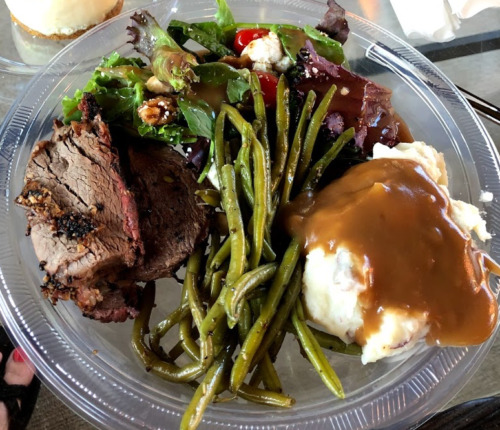
Sliced beef tenderloin, garlic mashed potatoes with gravy, roasted green beans, and a spring mix salad with tomatoes, cheese, walnuts and raspberry vinaigrette.
Protein
Here are some protein rich foods I have enjoyed a lot this pregnancy -
Wild caught salmon - which also has great healthy omega fats,
Beef sirloin steaks - cubed and seared with potatoes/rice and veggies. Or whole sirloin steaks sliced. I use grass fed beef.
Pork tenderloin,
Raw nuts and trail mixes,
Fruit and nut energy chews with protein,
Kefir drink and honey greek yogurt, sometimes with fruit and granola.
Beans and lentils- making meat, rice, bean and veggie stews or dishes. I love great northern beans, black beans and any kind of lentil.
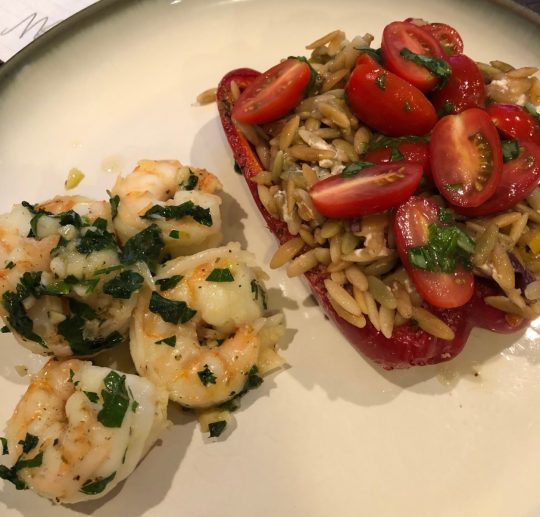
Sauteed shrimp with garlic, lemon and parsley,
& orzo stuffed red bell peppers with tomatoes, goat cheese and parsley.
Vegetables
I love veggies of all kinds, these are my personal favorites that I have been craving and cooking a lot this pregnancy -
Beets - I love to cube red and golden beats, drizzle with olive oil, sea salt and fresh rosemary, and roast in the oven. I eat them as a side dish or even drop in my salads.
Spinach - fresh in a salad, or sautéed with mushrooms, garlic and onions has been a favorite.
Basil (making a lot of pesto!)
Sweet bell peppers - raw in my salads, or with my favorite ginger soy stir fry with chicken, or in homemade coconut curry,
Arugula and spring mix salads with dried fruits, raw chopped veggies, walnuts, goat cheese and either homemade lemon or Italian vinaigrette,
Broccoli - steamed or sautéed with other veggies, it’s limitless!
Cilantro and parsley for sauces, tacos, pastas.
Lightly sautéed kale with parmesan & garlic or a sweet cranberry sauce has been my go-to.
Spaghetti squash, roasted with just parmesan and garlic, or tossed with gouda, tomatoes, garlic, spinach and mushrooms.
Avocados - I enjoy some good mashed avocado with lemon on toast, sliced on a sandwich, or guacamole. Avocado is a great way to get healthy fats.
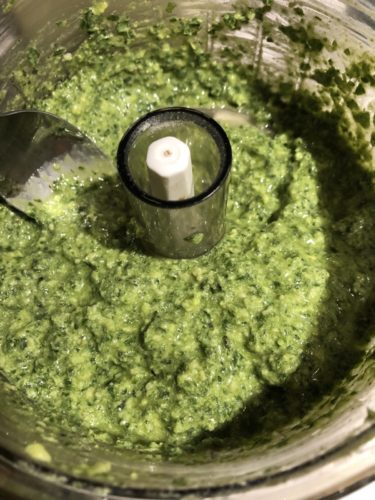
Homemade pesto - tons of basil, pine nuts, lemon juice, sea salt, and olive oil.
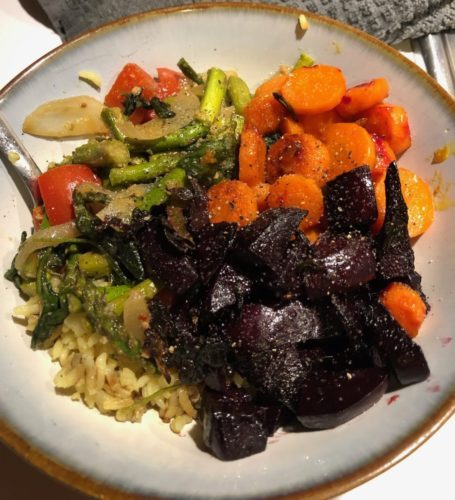
Veggie loaded rice! Turmeric garlic rice, with roasted beets, carrots, asparagus, sweet onions and tomatoes with herbs.
Fruits
I have craved fruits non-stop for both of my pregnancies, 8 years apart. I think I am mainly craving sugar in any form, and also being pregnant in the heat of the Texas summer, there is nothing better than snacking on my favorites - juicy cantaloupe, mangoes, watermelons, apples, oranges and raspberries!
I started juicing watermelons after always having too much left over, and after a little research, I have found watermelon to be especially beneficial for pregnant women. Eating or juicing watermelon has helped me with my nausea in the beginning of pregnancy, and then my acid reflux and heartburn later on into my second and third trimester. And of course, we know watermelon has a high water content, which can help with any swelling and muscle cramps that happens to most all of us pregnant women, especially at the end. I have been experiencing so much muscle cramping this time around and healthy fluids and water has been a staple for easing that pain.
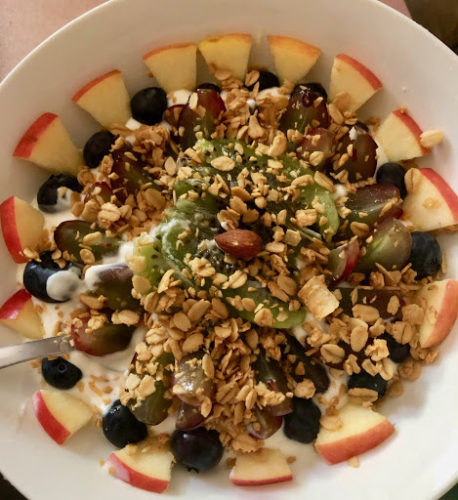
Honey greek yogurt with granola, apples, blueberries, grapes and kiwi.
Grains
Complex carbohydrates are important as well, they contain essential vitamins, minerals and fiber your body needs and your developing baby needs. Sticking with 100% whole grains is best to get the most nutrition from grains. I’ve been choosing whole honey wheat bread, quinoa, brown rice, steel cut oats, and whole wheat pasta as much as I can. Adding different grains to your diet can create so many different recipes. I got sick of oatmeal, so I made some oat bars with leftover steel cut oats I had sitting in my kitchen. You can mix bananas, blueberries, honey, and tons of other ingredients with oats and bake on a flat pan, and then cut into squares to make bars. Super easy and great for snacking or when I’ve been super tired in the morning and need to eat right away.
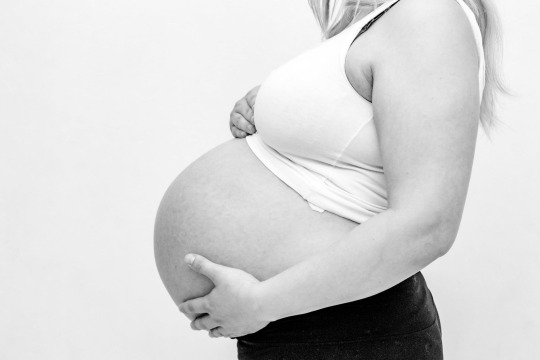
Balancing your cravings
I guess you could call me more of a “crunchy” mom. Especially when I’ve been pregnant and when my son was a baby and toddler, I was always reading ingredients, watching what I would feed him and allow him to have. But, I will say that I do love to indulge and think moderation is key for anything. Sometimes succumbing to a guilty pleasure will make you feel a little better and that is perfectly okay.
If you are eating healthy and sticking to primarily eating foods like I’ve listed above, then I say cave in to your cravings of ice cream, a cup of coffee, or your favorite candy every once in awhile. I certainly have several times during my pregnancy! Of course, always advise your OB or midwife if you have certain precautions for your pregnancy.
Overall, eating colorful, vitamin rich foods has helped me keep up with energy over the summer and I believe has been a huge part of having a balanced, healthy pregnancy.
Read the full article
0 notes
Text
Six Important Nutrients for a Healthy Pregnancy
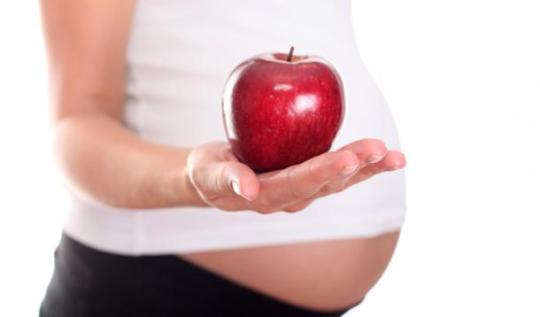
If you're expecting a child, chances are, you've reduce on high levels of caffeine, ditched alcohol, and you're staying clear of raw sushi as well as deli meats. However exactly what about making certain that you're covering every one of your bases nutrition-wise? In contrast to common belief, prenatal nutrition is a lot more complicated than just taking a prenatal multivitamin. There are specific nutrients that you'll intend to pay additional focus to when you're expectant. These nutrients are not just vital for assisting your baby grow and also establish optimally, yet also to maintain your health!
Protein:
Your healthy protein demands boost during the 2nd and also 3rd trimester of maternity. This makes feeling considering that you are essentially expanding another human! If your diet regimen isn't high sufficient in protein during maternity, your placenta might not function correctly in order to stop damaging compounds passing from you to your infant's blood stream. Several protein-rich foods additionally supply important nutrients like Iron, Vitamin B-12 and Zinc. You ought to be consuming approximately 0.8-1.2 grams of protein each kilo of body weight. For an average-weight female who is recreationally active (-135 pounds), you need to be intending for approximately 50-70 grams daily (pre-pregnancy as well as in your very first trimester). Due to the fact that your protein demands increase in your Second and also Third trimester, you should aim to take in an added 25 grams of healthy protein each day, the equal to 3 oz of cooked meat, chicken or fish. When you listen to that you need to enhance your calories in the Second as well as 3rd trimester, those additional calories should be coming mainly from protein-rich foods such as meats, eggs, milk items, beans, lentils and nuts and also seeds.
Iron:
Iron is necessary for oxygen transportation throughout your body as well as it also assists to reduce the risk of pre-term birth in addition to reduced birth weight. When you come to be expecting, your iron requires three-way (assume regarding all that additional blood that you have circulating in your body). It is necessary that you consume foods that are high in Iron everyday while expecting. Pet resources of iron include all meats, chicken, fish, and also eggs. These kinds of iron are the most effective soaked up- this kind of Iron is called Heme Iron. Plant sources of iron (non-heme iron) are not too absorbed, so it is essential that you couple them with foods that are high in Vitamin C, such as oranges, strawberries, melon or kiwi fruit, as Vitamin C enhances non-heme Iron absorption. It's difficult to obtain this extra iron from diet regimen alone, so what's advised is 27 mg each day. The majority of pre-natal multivitamins contain this quantity. If you become anemic during pregnancy (which is not unusual), your Medical Professional, Dietitian or Midwife may recommend an additional Iron supplement.
Folate:
Folic Acid is very vital to aid shield your infant against neural tube problems (which turn right into brain as well as spinal cable problems) in those very first days and also weeks after perception when numerous ladies are not conscious that they are pregnant. What's suggested is 400-1000 micrograms (mcg) or 0.4-1.0 mg per day (most pre-natal supplements consist of 1000 mcg or 1.0 mg). If you have delivered a child who has had spinabifida or another neural tube problem, your medical professional may advise that you take a higher dosage of Folic Acid during maternity. It is necessary to begin taking Folic Acid prior to you conceive, because your baby's neural tube will form simply 3 to 4 weeks after conception, when numerous females don't even recognize that they're pregnant. Folic acid is the synthetic kind of Folate, or Vitamin B9. Health food resources of Folate are spinach, broccoli, asparagus and fortified morning meal cereals.
Calcium:
Calcium is most important for the upkeep and also structure of healthy and balanced bones and teeth. It is also crucial for appropriate muscle mass feature, nerve transmission and hormonal balance. Calcium is especially crucial while pregnant, due to the fact that you are not only maintaining your own bone wellness, yet also expanding an additional human being inside of you that needs calcium. Your baby will certainly take what they needs in terms of calcium from you, for that reason, you will be the one that endures if you do not take in enough. Exactly what's advised by Wellness Canada is a consumption of 1000 mg of calcium each day (if you are over the age of 18) and 1300 mg of calcium if you are in between the ages of 14-18. Milk products (as well as calcium-fortified dairy products options) are the very best nutritional sources of calcium that we have. One serving of milk (1 cup) or yogurt (3/4 cup) or cheese (1.5 oz) consists of about 300 mg of calcium. Your pre-natal multivitamin likely contains another 200-300 mg of calcium and also if you are consuming a balanced healthy diet regimen, you will likely be taking in another 200-300 mg of calcium from non-dairy foods. That is regarding 600-900 mg covered currently. What's suggested is that pregnant females consume 2-3 portions of milk, yogurt or cheese daily to meet the recommended amounts.
Vitamin D:
Vitamin D helps our bodies utilize calcium as well as phosphorous to build and also maintain solid bones and teeth. It can be synthesized by the body after direct exposure to the sun, however, in Canada, because of our environment, the positioning of the sun, as well as the reality that we put on sunscreen, we do not manufacture an entire lot of Vitamin D from sun exposure. Insufficient vitamin D can cause calcium and phosphorus degrees in the blood to reduce, bring about calcium being leeched from the bones to assist maintain steady blood levels. This can trigger rickets in kids as well as osteomalacia (conditioning of the bones) or osteoporosis (vulnerable bones) in adults. While pregnant, it is very important that you get enough Vitamin D for appropriate wellness and a healthy and balanced pregnancy. The suggested amount is 600 IUs (worldwide units) each day. There are few all-natural sources of vitamin D in our food supply and also as a result of this, it is very important that you taking a supplement. Your pre-natal multivitamin will likely have between 200 and also 400 IU's. You could should cover up with an additional 400 IU's each day to meet your advised amounts. I frequently advise that expectant females take 400-1000 IUs in addition to their diet plan and also prenatal multivitamin to earn sure that they are getting enough. Inning Accordance With Wellness Canada, the Bearable Ceiling for expecting and also breastfeeding ladies is 4000 IUs each day, so 1000-2000 IU's overall is well listed below this.
Omega 3s:
Omega 3 fatty acids are vital for correct health and wellness in both babies and also adults. Especially when it pertains to pregnancy, advised quantities of Omega 3 have actually not been developed yet, however it is understood that Omega 3 fats (particularly DHA and EPA) are essential for correct brain, eye and also nerve advancement in an expanding baby in utero. What's recommended in Canada is eating 5 oz of fatty, reduced mercury fish per week to acquire adequate Omega 3 fats. Kinds of fatty fish that are additionally low in mercury and high in Omega Twos consist of salmon, light spotted tuna, halibut, and trout. If you are not a fish eater, it is recommended that you take a regulated Omega 3 fish oil supplement throughout maternity including in between 500-900 mg of DHA and EPA integrated daily.
0 notes
Text
Health and Nutrition During Pregnancy
Pregnancy
Pregnancy is a nine month journey … It is a time in your life to feel happy, excited, serene and joyful. However it is also quite normal to experience anxieties about the birth and worrying about whether you are nourishing yourself properly, exercising, keeping, calm, positive, loving thoughts and emotions within your being.
Pregnancy lasts 39 weeks or nine months from conception and is looked at in three stages.
Health & Nutrition During Pregnancy
To ensure that your baby develops in a healthy environment, you should keep your body as fit and well nourished as you possibly can. Do not think in terms of devising a special diet for pregnancy, it is more to do with eating a good variety of the right foods which are those that are rich in the essential nutrients.
Weight Gain
The amount of weight put on by women in pregnancy varies between 9 – 16 kilograms, with the most rapid gain usually between weeks 24 and 32.
Do not “eat for two”. Some 46 percent of women gain too much weight during pregnancy.
Diet During Pregnancy
You Are What You Eat therefore Your Baby Is What You Eat!
What You Eat affects your baby’s future. What you eat in the following nine months can affect your baby’s health, as well as your own, for decades to come.
A good diet is vital to health during pregnancy, and to the normal development of the baby. The time to pay attention to diet, and if necessary change it for the better, is several months prior to conception and not when pregnancy is confirmed.
During the critical early weeks the normal, healthy development of the embryo depends on the mother’s state of nutritional health and also her toxic state.
Mineral and vitamin imbalances which would probably go unnoticed in a child or adult can have a disastrous effect on the developing baby.
This is because the cells in the embryo are growing at such a rapid rate, causing an exaggerated response to any harmful effects.
A natural, organic, whole food diet is the only one which will adequately serve during pregnancy.
A high quality diet is needed to maintain your health and the best possible conditions for the baby to develop.
As our environment becomes more polluted and the soils more depleted of nutrients, going 100% organic, if possible, is the best thing you can do for oneself, and for a developing fetus, and last but not least; the environment.
Pesticides, herbicides, and other forms of pollution interfer with the metabolic pathways of many nutrients and thus indirectly interfer with the development of the immune, endocrine, and neurological systems.
Eating as many of our foods in their live, raw form preserves 70 to 80% more vitamins and minerals, 50% more bioactive protein, and up to 96% more bioavailable vitamin B12.
Grains, nuts and seeds are the most potent health-building foods of all. Eaten raw or sprouted if possible (some grains need to be cooked), they contain all the essential nutrients for human growth, sustenance, and ongoing optimal health.
A well balanced diet is based on whole cereals and grains (brown bread, rice, pasta, buckwheat, rye, oats), nuts and seeds, pulses and beans, fresh fruit and vegetables, pure unrefined oils such as cold pressed olive oil, with some fish and eggs if required.
Fruit and vegetables are all excellent sources of vitamins, minerals and trace elements provided they are eaten in the right way.
They should be fresh, either raw or quickly cooked, steamed or stir-fried, and preferably consumed immediately after they are harvested.
Salt is needed to maintain the extra volume of blood, to supply enough placental blood, and to guard against dehydration and shock from blood loss at birth, (except in cases of kidney and heart problems) Suggested form of salt is Himalayan Pink Salt.
Proteins
• Form the basic building blocks of all our body tissues, cells, hormones, and antibodies.
• Food must fuel the growth of the uterus, which can grow to 30 times its original size over the nine months gestation period Add the development of breastfeeding, placenta, development of breast milk, the baby’s body.
Proteins are divided into complete and incomplete:
Complete proteins contain significant amounts of all the essential amino acids, you find them in meat, poultry, fish, eggs, milk and soya bean products.
Vegetable proteins are incomplete and contain only some of the essential amino acids. Some vegetarian sources of complete protein are: buckwheat, sesame seeds, pumpkin seeds, sunflower seeds, flaxseeds, and almonds.
Plant proteins are easier for our bodies to digest and produce less toxic waste than animal proteins. The fiber in plants also has a very beneficial effect on the bowel; it ensures healthy bowel movements and the correct bacterial population in the gut, and anticipates the buildup of putreactive bacteria produced by excess animal proteins.
Eating meat and meat products also carries the risk from chemical and hormonal residues found in intensely reared animals. Also soya beans or soy products are mostly genetically engineered, it is wise to stay clear of them.
Pregnant women need about 60 to 75 grams of protein a day.
The best and cleanest sources of protein are green vegetables, spirulina, seeds (hemp, flax, sesame, poppy, sunflower, chia, quinoa, amaranth).
Real strength and building material comes from:
• green – leafy vegetables, seeds and superfoods. They contain all the amino acids we require.
Essential Fatty Acids are vital to:
• the development of the baby’s nervous and immune systems. They build the cell walls in all our tissues, and so that trace elements and fat-soluble vitamins (A, E, D, and K) can be absorbed.
• EFA’s are needed to make adrenal and sex hormones, and to maintain a healthy population of bacteria in the gut.
• They are also essential to the normal development of the fetus’s brain: 70 per cent of all EFAs go to the brain.
The Best Fatty Foods include:
Avocados, Borage Seed Oil, Raw Cacao Beans (Chocolate Nuts), Coconut oil / butter, Flax seed and its oil, Grape seeds, Hemp seed and its oil (cold pressed), RAW Nuts of all types (cashews must be soft to be truly “raw”), Nut Butters (almond butter is excellent), Olives and their oil (stone pressed or cold pressed), Peanuts (must be certified aflatoxin free), Poppy seeds, pumpkin seeds and their oil (cold pressed), Sesame seeds, sunflower seeds, tahini (sesame butter), or even better if you can get hold of it at a health food store unhulled tahini (an alkaline fat, high in calcium), Young Coconuts (young Thai coconuts are available in the US at Asian markets), Coconut milk, coconuts (mature).
SUPERFOODS
Superfoods are foods with extraordinary properties. Usually they contain all essential amino acids, high levels of minerals, and a wide array of unique, even rare, nutrients. I have included the superfoods in the nutritional tips below.
Some prominent superfoods to include:
1) Himalayan Pink Salt – offers 84 minerals exactly identical to the elements in your body.
2) Spirulina (a spiral algae consumed for thousands of years by indigenous people in Mexico and Africa)
-It has the highest concentration of protein on Earth. 60%
-It is also very high in Iron, and many other vitamins and minerals.
-It is one of the highest sources of gamma-linolenic acid (GLA) on the planet. Only mother’s milk is higher.
-It is recommended to take more Spirulina during breastfeeding because of the GLA.
-Spirulina is very high in human-active B12.
3) Blue-Green Algae (Klamath lake algae wonderful brain food). It is high in protein, chlorophyll, vitamins, and minerals and enhances the immune system.
I value it in pre-pregnancy, pregnancy, and lactation for its enhancing effect on brain function.
4) Bee Pollen (wild pollen, not orchard pollen, should be used and should come from ethically harvested sources where bees are treated respectfully. Bee Pollen is nature’s most complete food) All amino acids, immune system, brain, eyes.
5) Flax, Sunflower, Chia, Sesame and pumpkin seeds are the best to use. Flaxseeds are excellent and the highest vegetarian source of omega-3-essential fatty acids, important for the immune system, nervous system, and brain development. I recommend one to two tablespoons daily of the uncooked and unheated oil or three to six tablespoons of freshly ground flaxseeds. (Use a coffee grinder). You may also grind the other above mentioned seeds and add them to salads, and fruit salads.
6) Wild young coconuts (not be confused with white Thai coconuts found in markets, wild coconuts are one of the greatest foods on earth. Great in smoothies.
NUTRITION TIPS
Here Are Some Nutrition Tips that will help you both:
1) Get Enough Folic Acid. 400 micrograms (mcg) daily. Folic Acid reduces chance of birth defects such as spina bifida. Especially in the first 6 weeks of pregnancy.
2) Best Food Sources of Folic Acid are: RAW Green leafy vegetables, including spinach, kale, beet greens, beet root, chard, asparagus, and broccoli. Starchy vegetables containing folic acid are corn, lima beans, green peas, sweet peas, sweet potatoes, artichokes, okra, and parsnips. Oats are high in folic acid as well as whole wheat brown bread. Many fruits have folic acid such as oranges, cantaloupe, pineapple, banana, and many berries including loganberries, boysenberries, and strawberries. Also fresh sprouts such as lentil, mung bean sprouts are excellent sources. REMINDER: Folic acid is available from fresh, unprocessed food, which is why it is so common a deficient in our culture’s processed, cooked food diet.
3) Eat Your Fish. Getting enough DHA (found in abundance in seafood and flaxseed) is one of the most important things you can do for you and your developing baby’s health. DHA is the omega-3 fatty acid that can boost baby’s brain development before birth, leading to better vision, memory, motor skills and language comprehension in early childhood. Eat at least 12 ounces a week of low-mercury fish, or take a DHA supplement such as Krill Oil.
• Avoid large, predatory fish such as shark, swordfish, king mackerel and tilefish. (As big fish eat smaller fish, the larger, longer-living ones accumulate more mercury).
• Seaweed and Cilantro remove heavy metals and radioactive isotopes from the tissues.
4) Avoid Alcohol – The main risk of consuming alcohol during pregnancy is the development of “fetal alcohol syndrome” (FAS). mother .. NO AMOUNT IS SAFE. AVOID TOTALLY.
5) Avoid Caffeine: In high amounts causes birth defects and still births, miscarriages and premature delivery.
6) Avoid Drugs – As far as possible all orthodontic drugs should be avoided during pregnancy, especially in the first three months. Consider natural alternatives and visiting a medical herbalist or nutritionist prior to conception.
FOODS THAT MAY CAUSE INFECTIONS
Although the chance of contracting one of these rare infections is limited, you will reduce this likelihood even further if you follow the basic guidelines given here.
Listeriosis – caused by the bacterium Listeria monocytogenes, this is a very rare infection. Its symptoms are similar to flu and gastroenteritis and it can cause stillbirth.
Toxoplasmosis – usually symptomless (apart from mild flu symptoms), this can cause serious problems for the baby. Caused by direct contact with the organism Toxoplasma Gondi, it is found in cat faeces, raw meat, and unpasteurized goats’ milk. Soil on fruit and vegetables may be contaminated.
Salmonella – Contamination with Salmonella bacterium can cause bacterial food poisoning. This does not typically harm the baby directly, but any illness involving a high temperature, vomiting, diarrhea, and dehydration could cause a miscarriage or preterm labor.
HERBS TO AVOID DURING PREGNANCY.
Herbal remedies are for the most part quite safe to be taken during pregnancy; some are useful alternatives to drugs both in chronic illness and acute minor problems such as may arise during pregnancy. It is still prefer to take NO MEDICATION whatever in the first three months, unless there is a specific problem that needs treatment.
There are many Herbs which should never be taken in pregnancy – their emmonagogue or oxytocic properties may, in large amounts, cause uterine contracts and thereby risk miscarriage: I will only mention a few as there at least twenty on the list.
Nutmeg Myristica Fragrans
Thuja Thuja occidentalis
Calendula Calendula officinalis
Sage Salvia officinalis
Thyme Thymus vulgaris
Marjoram Origanum vulgare
Lovage Levisticum officinale
Rosemary Rosmarinus Officinalis
Rhubarb Rheum sp.
Herbs that are safe to eat to take in culinary doses but not as a medicine during pregnancy include:
celery seed, cinnamon, fennel, fenugreek, oregano, parsley, rosemary, sage and saffron.
If you enjoyed reading this article and would like to read the full version of this e-book called ‘A Natural Approach to Pregnancy’, visit my website http://www.easyconsciousliving.com or e-mail me at: barbara @ easyconsciousliving .com
————————————————– ————————————————– ——–
“The Doctor Of The Future Will Give No Medicines, But Will Interest His Patients In The Care Of The Human Frame, In Diet, And In The Causes Of Diseases.”
– Edomom Edison.
Source by Barbara Karafokas
from Home Solutions Forev https://homesolutionsforev.com/health-and-nutrition-during-pregnancy/
via Home Solutions on WordPress
from Home Solutions FOREV https://homesolutionsforev.tumblr.com/post/185930169315
via Tim Clymer on Wordpress
0 notes
Text
Health and Nutrition During Pregnancy
Pregnancy
Pregnancy is a nine month journey … It is a time in your life to feel happy, excited, serene and joyful. However it is also quite normal to experience anxieties about the birth and worrying about whether you are nourishing yourself properly, exercising, keeping, calm, positive, loving thoughts and emotions within your being.
Pregnancy lasts 39 weeks or nine months from conception and is looked at in three stages.
Health & Nutrition During Pregnancy
To ensure that your baby develops in a healthy environment, you should keep your body as fit and well nourished as you possibly can. Do not think in terms of devising a special diet for pregnancy, it is more to do with eating a good variety of the right foods which are those that are rich in the essential nutrients.
Weight Gain
The amount of weight put on by women in pregnancy varies between 9 – 16 kilograms, with the most rapid gain usually between weeks 24 and 32.
Do not "eat for two". Some 46 percent of women gain too much weight during pregnancy.
Diet During Pregnancy
You Are What You Eat therefore Your Baby Is What You Eat!
What You Eat affects your baby's future. What you eat in the following nine months can affect your baby's health, as well as your own, for decades to come.
A good diet is vital to health during pregnancy, and to the normal development of the baby. The time to pay attention to diet, and if necessary change it for the better, is several months prior to conception and not when pregnancy is confirmed.
During the critical early weeks the normal, healthy development of the embryo depends on the mother's state of nutritional health and also her toxic state.
Mineral and vitamin imbalances which would probably go unnoticed in a child or adult can have a disastrous effect on the developing baby.
This is because the cells in the embryo are growing at such a rapid rate, causing an exaggerated response to any harmful effects.
A natural, organic, whole food diet is the only one which will adequately serve during pregnancy.
A high quality diet is needed to maintain your health and the best possible conditions for the baby to develop.
As our environment becomes more polluted and the soils more depleted of nutrients, going 100% organic, if possible, is the best thing you can do for oneself, and for a developing fetus, and last but not least; the environment.
Pesticides, herbicides, and other forms of pollution interfer with the metabolic pathways of many nutrients and thus indirectly interfer with the development of the immune, endocrine, and neurological systems.
Eating as many of our foods in their live, raw form preserves 70 to 80% more vitamins and minerals, 50% more bioactive protein, and up to 96% more bioavailable vitamin B12.
Grains, nuts and seeds are the most potent health-building foods of all. Eaten raw or sprouted if possible (some grains need to be cooked), they contain all the essential nutrients for human growth, sustenance, and ongoing optimal health.
A well balanced diet is based on whole cereals and grains (brown bread, rice, pasta, buckwheat, rye, oats), nuts and seeds, pulses and beans, fresh fruit and vegetables, pure unrefined oils such as cold pressed olive oil, with some fish and eggs if required.
Fruit and vegetables are all excellent sources of vitamins, minerals and trace elements provided they are eaten in the right way.
They should be fresh, either raw or quickly cooked, steamed or stir-fried, and preferably consumed immediately after they are harvested.
Salt is needed to maintain the extra volume of blood, to supply enough placental blood, and to guard against dehydration and shock from blood loss at birth, (except in cases of kidney and heart problems) Suggested form of salt is Himalayan Pink Salt.
Proteins
• Form the basic building blocks of all our body tissues, cells, hormones, and antibodies.
• Food must fuel the growth of the uterus, which can grow to 30 times its original size over the nine months gestation period Add the development of breastfeeding, placenta, development of breast milk, the baby's body.
Proteins are divided into complete and incomplete:
Complete proteins contain significant amounts of all the essential amino acids, you find them in meat, poultry, fish, eggs, milk and soya bean products.
Vegetable proteins are incomplete and contain only some of the essential amino acids. Some vegetarian sources of complete protein are: buckwheat, sesame seeds, pumpkin seeds, sunflower seeds, flaxseeds, and almonds.
Plant proteins are easier for our bodies to digest and produce less toxic waste than animal proteins. The fiber in plants also has a very beneficial effect on the bowel; it ensures healthy bowel movements and the correct bacterial population in the gut, and anticipates the buildup of putreactive bacteria produced by excess animal proteins.
Eating meat and meat products also carries the risk from chemical and hormonal residues found in intensely reared animals. Also soya beans or soy products are mostly genetically engineered, it is wise to stay clear of them.
Pregnant women need about 60 to 75 grams of protein a day.
The best and cleanest sources of protein are green vegetables, spirulina, seeds (hemp, flax, sesame, poppy, sunflower, chia, quinoa, amaranth).
Real strength and building material comes from:
• green – leafy vegetables, seeds and superfoods. They contain all the amino acids we require.
Essential Fatty Acids are vital to:
• the development of the baby's nervous and immune systems. They build the cell walls in all our tissues, and so that trace elements and fat-soluble vitamins (A, E, D, and K) can be absorbed.
• EFA's are needed to make adrenal and sex hormones, and to maintain a healthy population of bacteria in the gut.
• They are also essential to the normal development of the fetus's brain: 70 per cent of all EFAs go to the brain.
The Best Fatty Foods include:
Avocados, Borage Seed Oil, Raw Cacao Beans (Chocolate Nuts), Coconut oil / butter, Flax seed and its oil, Grape seeds, Hemp seed and its oil (cold pressed), RAW Nuts of all types (cashews must be soft to be truly "raw"), Nut Butters (almond butter is excellent), Olives and their oil (stone pressed or cold pressed), Peanuts (must be certified aflatoxin free), Poppy seeds, pumpkin seeds and their oil (cold pressed), Sesame seeds, sunflower seeds, tahini (sesame butter), or even better if you can get hold of it at a health food store unhulled tahini (an alkaline fat, high in calcium), Young Coconuts (young Thai coconuts are available in the US at Asian markets), Coconut milk, coconuts (mature).
SUPERFOODS
Superfoods are foods with extraordinary properties. Usually they contain all essential amino acids, high levels of minerals, and a wide array of unique, even rare, nutrients. I have included the superfoods in the nutritional tips below.
Some prominent superfoods to include:
1) Himalayan Pink Salt – offers 84 minerals exactly identical to the elements in your body.
2) Spirulina (a spiral algae consumed for thousands of years by indigenous people in Mexico and Africa)
-It has the highest concentration of protein on Earth. 60%
-It is also very high in Iron, and many other vitamins and minerals.
-It is one of the highest sources of gamma-linolenic acid (GLA) on the planet. Only mother's milk is higher.
-It is recommended to take more Spirulina during breastfeeding because of the GLA.
-Spirulina is very high in human-active B12.
3) Blue-Green Algae (Klamath lake algae wonderful brain food). It is high in protein, chlorophyll, vitamins, and minerals and enhances the immune system.
I value it in pre-pregnancy, pregnancy, and lactation for its enhancing effect on brain function.
4) Bee Pollen (wild pollen, not orchard pollen, should be used and should come from ethically harvested sources where bees are treated respectfully. Bee Pollen is nature's most complete food) All amino acids, immune system, brain, eyes.
5) Flax, Sunflower, Chia, Sesame and pumpkin seeds are the best to use. Flaxseeds are excellent and the highest vegetarian source of omega-3-essential fatty acids, important for the immune system, nervous system, and brain development. I recommend one to two tablespoons daily of the uncooked and unheated oil or three to six tablespoons of freshly ground flaxseeds. (Use a coffee grinder). You may also grind the other above mentioned seeds and add them to salads, and fruit salads.
6) Wild young coconuts (not be confused with white Thai coconuts found in markets, wild coconuts are one of the greatest foods on earth. Great in smoothies.
NUTRITION TIPS
Here Are Some Nutrition Tips that will help you both:
1) Get Enough Folic Acid. 400 micrograms (mcg) daily. Folic Acid reduces chance of birth defects such as spina bifida. Especially in the first 6 weeks of pregnancy.
2) Best Food Sources of Folic Acid are: RAW Green leafy vegetables, including spinach, kale, beet greens, beet root, chard, asparagus, and broccoli. Starchy vegetables containing folic acid are corn, lima beans, green peas, sweet peas, sweet potatoes, artichokes, okra, and parsnips. Oats are high in folic acid as well as whole wheat brown bread. Many fruits have folic acid such as oranges, cantaloupe, pineapple, banana, and many berries including loganberries, boysenberries, and strawberries. Also fresh sprouts such as lentil, mung bean sprouts are excellent sources. REMINDER: Folic acid is available from fresh, unprocessed food, which is why it is so common a deficient in our culture's processed, cooked food diet.
3) Eat Your Fish. Getting enough DHA (found in abundance in seafood and flaxseed) is one of the most important things you can do for you and your developing baby's health. DHA is the omega-3 fatty acid that can boost baby's brain development before birth, leading to better vision, memory, motor skills and language comprehension in early childhood. Eat at least 12 ounces a week of low-mercury fish, or take a DHA supplement such as Krill Oil.
• Avoid large, predatory fish such as shark, swordfish, king mackerel and tilefish. (As big fish eat smaller fish, the larger, longer-living ones accumulate more mercury).
• Seaweed and Cilantro remove heavy metals and radioactive isotopes from the tissues.
4) Avoid Alcohol – The main risk of consuming alcohol during pregnancy is the development of "fetal alcohol syndrome" (FAS). mother .. NO AMOUNT IS SAFE. AVOID TOTALLY.
5) Avoid Caffeine: In high amounts causes birth defects and still births, miscarriages and premature delivery.
6) Avoid Drugs – As far as possible all orthodontic drugs should be avoided during pregnancy, especially in the first three months. Consider natural alternatives and visiting a medical herbalist or nutritionist prior to conception.
FOODS THAT MAY CAUSE INFECTIONS
Although the chance of contracting one of these rare infections is limited, you will reduce this likelihood even further if you follow the basic guidelines given here.
Listeriosis – caused by the bacterium Listeria monocytogenes, this is a very rare infection. Its symptoms are similar to flu and gastroenteritis and it can cause stillbirth.
Toxoplasmosis – usually symptomless (apart from mild flu symptoms), this can cause serious problems for the baby. Caused by direct contact with the organism Toxoplasma Gondi, it is found in cat faeces, raw meat, and unpasteurized goats' milk. Soil on fruit and vegetables may be contaminated.
Salmonella – Contamination with Salmonella bacterium can cause bacterial food poisoning. This does not typically harm the baby directly, but any illness involving a high temperature, vomiting, diarrhea, and dehydration could cause a miscarriage or preterm labor.
HERBS TO AVOID DURING PREGNANCY.
Herbal remedies are for the most part quite safe to be taken during pregnancy; some are useful alternatives to drugs both in chronic illness and acute minor problems such as may arise during pregnancy. It is still prefer to take NO MEDICATION whatever in the first three months, unless there is a specific problem that needs treatment.
There are many Herbs which should never be taken in pregnancy – their emmonagogue or oxytocic properties may, in large amounts, cause uterine contracts and thereby risk miscarriage: I will only mention a few as there at least twenty on the list.
Nutmeg Myristica Fragrans
Thuja Thuja occidentalis
Calendula Calendula officinalis
Sage Salvia officinalis
Thyme Thymus vulgaris
Marjoram Origanum vulgare
Lovage Levisticum officinale
Rosemary Rosmarinus Officinalis
Rhubarb Rheum sp.
Herbs that are safe to eat to take in culinary doses but not as a medicine during pregnancy include:
celery seed, cinnamon, fennel, fenugreek, oregano, parsley, rosemary, sage and saffron.
If you enjoyed reading this article and would like to read the full version of this e-book called 'A Natural Approach to Pregnancy', visit my website http://www.easyconsciousliving.com or e-mail me at: barbara @ easyconsciousliving .com
————————————————– ————————————————– ——–
"The Doctor Of The Future Will Give No Medicines, But Will Interest His Patients In The Care Of The Human Frame, In Diet, And In The Causes Of Diseases."
– Edomom Edison.
Source by Barbara Karafokas
from Home Solutions Forev https://homesolutionsforev.com/health-and-nutrition-during-pregnancy/
via Home Solutions on WordPress
0 notes
Text
In Part One of this series, we learned about how making simple diet and lifestyle changes can positively affect moms health and the health of her baby. In part two of this series, I would like to offer some recipes and strategies specific to incorporating nourishing foods.
If you are new to this approach to health. Don’t look for perfection!! Instead, incorporate a little at a time. The goal is to follow this approach to eating for a lifetime.
First, a quick trip down memory lane for me…In case you are wondering why I am so diligent about my health and the my kids’ health through nutrition. Here is the girls’ amazing birth story. They are here! One week old!
Next, my story of the girls’ hospital stay. What a powerfully difficult time! Just as their birth is grooved in my memory, the eight days I spent in the hospital with them is also heavy in my heart. That was one of the most challenging times of my life, being separated from the boys and eager to get my girls home safely. Here is my story…Home sweet home: NICU, sleeping at the hospital and meeting the brothers

OK, NOW ONTO THE ARTICLE: WHAT TO TAKE OUT AND WHAT TO ADD IN.
Looking back ay my article, Gut Health During Pregnancy Part 2 I made some key points including the cascade affect that an unhealthy gut can have on your whole system.
Once you remove the harmful, inflammatory foods discussed in Part One, here is what you can add in…
Eat plenty of soluble and insoluble fiber to feed your beneficial bacteria. Here’s a list of some other sources of Paleo friendly fermentable fiber:
Vegetables: alliums (garlic, leek, onion family), artichoke and Jerusalem artichoke, asparagus, burdock root, chicory root, dandelion root, mushrooms, okra, yams, sweet potatoes, green leafy vegetables, carrots and other root vegetables
Fruits with an edible peel: apples, pears, berries, carob, citrus, stone fruits (apricot, peaches, plums, etc.)
Nuts and seeds, including seeds used as spices: Again, the fermentable fiber concentrates in the skins, so purchase nuts with skins.
Eat plenty of home fermented foods to restore your beneficial bacteria. Home fermentation is key because the most jarred sauerkraut and kimchi found in the stores is pasteurized and does not contain live cultures. Bubbies brand of sauerkraut does contain live cultures and is not pasteurized. Examples of home fermented foods include: beet kavas, sauerkraut, kimchi, fermented vegetables, lacto-fermented mayonnaise or applesauce, and kombucha.
Make soups and stews with a rich base of bone broth made from pastured (preferably grass fed) bones. Sarah Ballentyne, author of The Paleo Approach describes the healing effects of bone broth. Balentyne writes, “…the resulting liquid is rich in numerous vitamins, minerals, antioxidants (especially calcium, magnesium, and phosphorous, which are essential for bone health), and gylcine.” Glycine is key component of connective tissue. Consuming glycine rich foods is essential for healing microscopic damage done to the gut barrier.
Consume organ meats on a regular basis. Organ meat is a rich source of glycine and collagen and elastin, which are essential for healing and repair.
If you tolerate dairy, organic (raw, if possible), full fat fermented dairy is an excellent source of live cultures. Examples include yogurt and knifer.
You can also use supplements to aid in rebalancing the gut if you are unable to use a whole food approach. Some key supplements include: vitamin D, glycine, probiotics (especially soil based probiotics), and antioxidants such as vitamin C.
How to incorporate these foods into yours and your family’s meal plan.
Here are a few recipes to incorporate organ meat, fermentable fiber and bone broth.
Organ Meat “Chili” with Veggies
Paleo Apple Cobbler with a Seed and Nut Crumb Topping
Paleo Beef Heart Stew
Bone Marrow Chili with a Surprise
Organ Meat Meatballs and Sauce
Garden Turkey Burgers and Garden Organ Meat Tacos
Here are some simple home fermentation recipes that you can do with a couple simple ingredients.
Raw Sauerkraut
Fermented Carrots
Kombucha!
A healthy gut usually equates to a healthy system. Here is a gift for you to get started from THRIVE MARKET**
Use THIS LINK TO GET 20% YOUR FIRST THREE ORDERS.
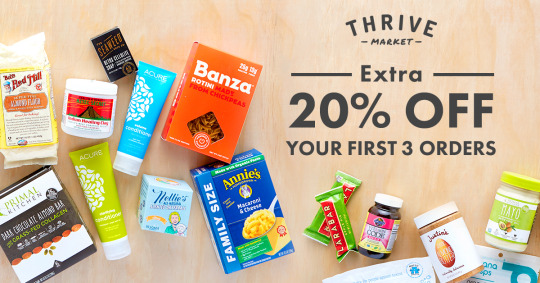
Prenatal Gut Health–Part Two In Part One of this series, we learned about how making simple diet and lifestyle changes can positively affect moms health and the health of her baby.
#fermentable fiber#glycine rich foods#mom motivation#NICU story#organ meat recipes#prenatal gut health#Thrive market discount code#two sets of twins#VBAC delivery after Csection
0 notes
Text
How should you eat in which trimester of pregnancy?

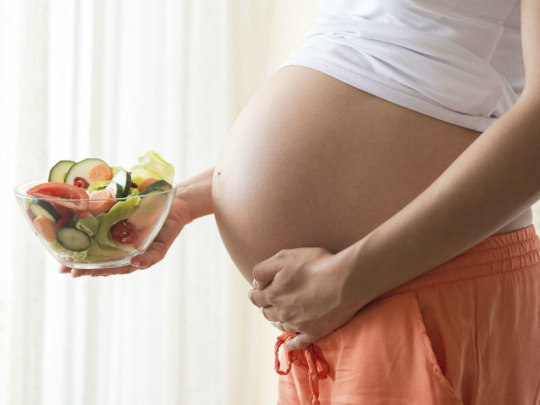
How should you eat in which trimester of pregnancy?
How you feed from the first month of pregnancy to the birth is very important for the health of both you and your baby. What you need to eat in which trimester and how much depends on your baby's needs and pregnancy problems you can experience. How you should feed during pregnancy, and you should be able to give every trimester the right, we have prepared a detailed article for you.
1. Nutrition in the first 3 months of pregnancy: How should nutrition be in the first trimester of pregnancy?
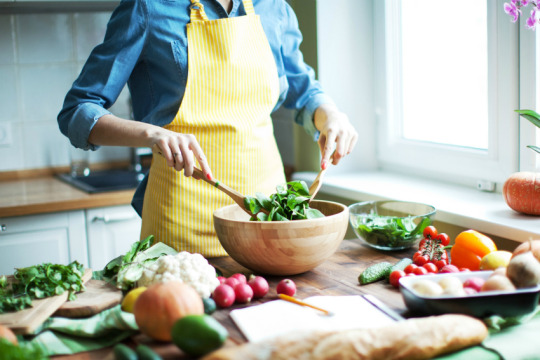
Nutrition in the first 3 months of pregnancy: How should nutrition be in the first trimester of pregnancy?
In the first 3 months, the baby is only poppy. Therefore, you do not need to eat more than usual. A daily increase of 100 calories is enough for you in this period. The amount of calories you need to consume is between 2500-2700.
The biggest supporters in the first months of pregnancy: Folic acid and vitamin D
Folic acid ensures that your baby can complement the central nervous system in a healthy way. It prevents spina bifida (spine remaining) disease and brain development anomalies in babies. Therefore, you should both feed on foods containing folic acid and supplement folic acid - an average of 400 micrograms per day, but you should still consult your doctor.
Keep in mind that folic acid stores, such as citrus fruits, spinach, broccoli, and cabbage with green leaves. Squeezing tangerines and oranges is of course the best, but if you can't drink it, you can slice it and add it to your salads.
As for vitamin D… We normally take vitamin D from the sun, but the need for vitamin D increases during pregnancy. That's why you need to take 10 micrograms of vitamin D supplements daily during the first trimester of pregnancy. In addition, vitamin D is very important for bone health.
Let's intervene like this:What to Eat for Weight Loss and Development of the Baby During Pregnancy?
The big problem of the first trimester: Nausea

The big problem of the first trimester: Nausea
The biggest problem you can experience from the first weeks of pregnancy is nausea. To prevent and reduce nausea, what you should pay attention to in the nutrition program are:
Rule to eat often and little. Don't leave your stomach empty.Starchy foods are better tolerated. Sandwiches and toast may be saviors during this period.Avoid spicy and fatty foods.Ginger fights nausea. Thank him and consume it.Vitamin B6 is good for nausea. You can get the vitamin B6 you need from chicken and beef, liver, banana, potato, egg, pistachio, walnut and hazelnut. It is also useful to consult your doctor for vitamin B6 supplements.
For nutrition such as nutrition: Foods rich in protein, calcium and iron
Iron helps carry blood in the body and ensures the formation of red blood cells, which are necessary for the baby in the first 3 months of pregnancy. Therefore, you should consume iron-containing foods abundantly. For example, broccoli, chicken and meat products are iron stores.
Apart from these, neither should eat nor take the necessary calcium and protein during pregnancy, let the foods come:
Whole grains: They provide the fiber your body needs. Whole-grain bread and pastas should be on the pregnancy menu, 3 servings a day.Lentils and nuts: Protein is very important for your baby's tissue and muscle development. Lentils and nuts are foods that will provide you with the necessary protein. In the meantime, we said little, often, and eaten dry, in this sense, life-saving foods.Yogurt and egg: Calcium supports the bone development of your baby. For this reason, eggs and yogurt must be in their meals from the first weeks of pregnancy to the second month.Salmon: Salmon , rich in calcium and vitamin D, is a favorite of many pregnant women as one of the fishes that are not inconvenient to eat during pregnancy.
Dietician Müge Şafak Özyurt also has something to say:How To Be A Nutrition List During Pregnancy?
What foods and drinks should you stay away from in the first trimester?
Fish containing heavy metal (such as tuna, swordfish),Raw fish such as sushi, raw egg,Undercooked meats (delicatessen products such as salami),Soft and unpasteurized cheeses and milk,Alcohol,Caffeine (Reduce as much as possible.).
Look, this issue is important:The list of things that should not be eaten during pregnancy!
2. Nutrition in the second 3 months of pregnancy: What should be the nutrition in the second trimester of pregnancy?
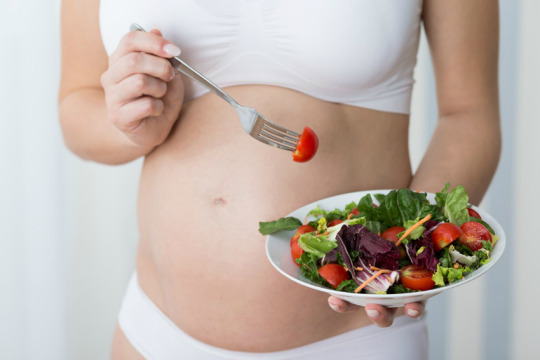
Nutrition in the second 3 months of pregnancy: What should be the nutrition in the second trimester of pregnancy?
Although the nutritional recommendations during pregnancy differ according to the changes in trimesters, they are generally the same. But the first thing to watch out for in the second trimester is to avoid low calories. Because your baby will start growing fast. If you eat low-calorie, the ketone rate in the blood may increase and mental retardation may occur in your baby. It is good if your daily calorie increase during this period is 300-350.
You should eat protein-rich foods twice a day. Such as lean meats, eggs, beans, lentils.
Green leafy vegetables and starchy foods are also available for folic acid. There is no need for folic acid supplements after the 12th week, but you should continue with vitamin D. Meanwhile, asparagus is a nutrient-filled vitamin D.
Her baby needs calcium and vitamin D for bone and tooth development. Omega-3 for brain development. Oily fish help you meet omega-3 needs, not twice a week.
You may experience anemia during this period. What does this mean? You need to eat iron-containing foods such as red meat, chicken, fish, legumes, kidney beans, spinach and raisins.
Eat 5 servings of fruits and vegetables a day. Let them be fresh and seasonal.
Consume starchy and wholemeal, complex carbohydrate foods such as bread, pasta, potatoes, rice, and grains at each meal.
You can meet your calcium needs by consuming low-fat dairy products 2-3 times a day.
It is important to achieve weight balance:What should I do to avoid uncontrolled weight gain during pregnancy?
What foods and drinks should you stay away from during the second trimester?
Unpasteurized foods,Raw or undercooked meat, chicken and fish.
Let's make a warning like this: When preparing food at home, make sure that the raw food does not come in contact with vegetables, chicken, fish and red meat. Cut them on a separate cutting board with a different knife.
3. Nutrition in the Last 3 Months of Pregnancy: How should Nutrition be in the Third Trimester of Pregnancy?
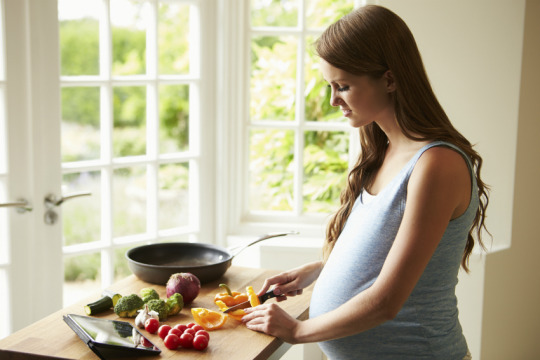
3. Nutrition in the Last 3 Months of Pregnancy: How should Nutrition be in the Third Trimester of Pregnancy?
In the last months of pregnancy, you will need the most energetic foods. During this period, your baby gains weight quickly. You may need to get extra energy between 300-350 calories per day. Even if you are a low-weight pregnant, it is appropriate to increase 500 calories daily in recent months.
Continue with vitamin D. The need for vitamin D usually persists even while breastfeeding. Fatty fish, eggs and cereals are ready to feed you in terms of vitamin D.
Your need for vitamin C increases by 25% in the last months of pregnancy. You should eat at least one vitamin C-rich fruit a day. Such as orange, tangerine, grapefruit, strawberry and blueberry.
Dark green vegetables, folic acid and iron storage. Eat a lot.
Keep eating starchy and wholemeal carbohydrate foods at every meal.
Eat twice a day with protein-containing foods such as lean meat, poultry, fish, eggs, almonds, peas, nuts, seeds, beans, lentils, soy and tofu.
Pregnant women over the age of 18 have a daily calcium need of 1000 and those under the age of 18 are 1300 mg. Do not forget to consume calcium-containing foods such as dark green vegetables, peas, haricot beans, nuts, peanuts and tofu.
Do not forget about Omega-3, do not forget to eat fish. Especially in the 3rd trimester, your need for omega-3 increases and increases; because your baby's brain development accelerates. Vegetable sources of purslane, walnut, flaxseed oil as well as seafood are among the delicious supporters that enable you to meet your omega-3 needs.
How should nutrition be against the common problems in the third trimester?
Constipation: Some pregnancy hormones slow bowel movements. Also, iron medications can cause constipation during pregnancy. For the problem of constipation, you should eat a lot of whole grains and fiber foods, drink blood and water. We are with you in your struggle with this annoying problem with more information: Guide to Coping with Constipation During PregnancyAnemia: Consume red meat, fatty fish, beans, lentils, chickpeas and fortified breakfast cereals to avoid anemia problems during pregnancy.Heartburn: Eating with frequent meals and small portions is the main medicine of heartburn. And of course if you are eating late in the evening, put an end to this now.Fatigue: Fatigue is a common complaint during pregnancy. If you eat whole foods, fruits and vegetables instead of sweet foods, your energy level increases.Edema: If you drink plenty of low-sugar fluids - drink water if possible - you can get the excess fluid out of your body.
Read the full article
0 notes